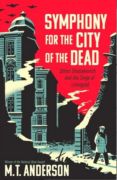
Symphony for the City of the Dead: Dmitri Shostakovich and the Siege of Leningrad
Written by M.T. Anderson
Candlewick Press, 2015, 456 pp.
ISBN: 9780763668181
For our generation, kindness was an old-fashioned, vanished quality, and its exponents were as extinct as mammoths. (p.372)
Symphony for the City of the Dead is filled with accounts of those who lived through the horrific events of the Nazi siege of Leningrad between September 1941 and January 1944. This documentation includes the reasons for the siege, the events that led to the siege, the relationship of Stalin to the Russian people, and the life of composer Dmitri Shostakovich, who wrote the famous symphony for Leningrad during the siege. Meant to kill the morale of Russia and the “sub-humans” that inhabited Russia, the siege of Leningrad was one of the most critical moves of Nazi Germany in Hitler’s attempt to conquer Russia. Shostakovich, a citizen of Leningrad and a composer, was asked to write the symphony as a way of boosting morale as well as inspiring other nations (including the US) to come to Russia’s aid. Because of the fear-based society the book documents, there will always be questions about the veracity of the accounts, but this is a fascinating and informative read that portrays the misery humans will inflict upon each other and the atrocities committed during war. The book also portrays the generosity and attempts to remain human under extremely inhumane conditions.
Shostakovich’s life presented within this narrative creates a microcosm of the larger conditions experienced in Russia during the late 1930s through the late 1940s. Readers will gain a real sense of the fear the Russian people experienced under Stalin’s dictatorship, as well as the events that weakened Russia just prior to World War II. These events are not only shocking, but give a real sense of individual lives as their communities and country deteriorated under a regime that trusted the very leader who was plotting the destruction of Russia. Shostakovich remained kind and generous even as his life was threatened by Stalin and Stalin’s policies that destroyed the Russian arts, military, and sense of community, but embraced the belief that Hitler was honorable. Readers will discover the importance of the symphony Shostakovich wrote about Leningrad, its reception within Russia and across the world, and then its eventual demise as the political environment changed and suspicion ruled governmental decisions. The adage of the “tallest poppy” certainly pertains to this account of Leningrad and Russia during this time period.
This narrative for adolescents would make a great companion to books such as A Night Divided by Jennifer Nielson (2015) and My Brother’s Secret by Dan Smith (2015), the first of which portrays life in East Berlin after WWII while the second presents the circumstances of a family that does not agree with Hitler’s policies during WWII. Additionally, this would make a great addition to any text set that addresses how communities across the world respond to governmental policies that pit citizen against citizen and neighbor against neighbor. A story that will evoke great discussions about one’s own actions in silencing others based on fear and power, Symphony for the Dead will engage readers in the extreme circumstances of WWII and the nature of war as well as what it means to live under conditions that attempt to destroy both individuality and freedom by any means necessary. Well-written and well documented, this informational text is both disturbing and enlightening.
M.T. Anderson is the author of Feed (2012), which won the Los Angeles Times Book Prize, and The Astonishing Life of Octavian Nothing: Traitor to the Nation Volume I: The Pox Party (2008) won a National Book Award and was a New York Times bestseller. Octavian and its sequel, The Kingdom on the Waves (2009), were also named Michael L. Printz Honor Books. Meticulously researched and documented, Symphony for the Dead is a 2016 YALSA Award for Excellence in Nonfiction for Young Adults Finalist. M. T. Anderson lives in Cambridge, Massachusetts and more about him and his work can be found at his website.
Holly Johnson, University of Cincinnati, Cincinnati, OH
WOW Review, Volume VIII, Issue 4 by Worlds of Words is licensed under a Creative Commons Attribution-NonCommercial-ShareAlike 4.0 International License. Based on work at https://wowlit.org/on-line-publications/review/viii-4/
